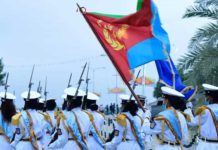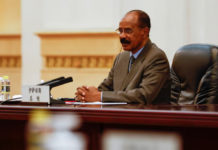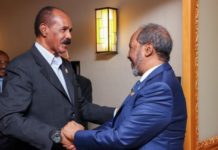Aim:
The aim of the April Conference has always been for it to be part of an ongoing process. The Conference was seen as a step along that road; not as an end in itself. The final objective is the establishment of Eritrea as a democratic state.
Introduction:
The peace deal with Ethiopia has removed the threat of war. While this has lifted a huge weight off the shoulders of its people, they have so far seen few benefits. President Isaias Afwerki has kept them in the dark about their country’s direction of travel. The partial opening of the border has increased trade and the flow of goods, but this has not been sufficient to persuade many from continuing to flee from the country.
At the heart of the problem lies the dictatorship. Deprived of the rights enshrined in the UN Charter, the Eritrean people are increasingly angry and frustrated. With the ending of the military threat from Ethiopia many are asking why the road to rule of law and democracy remains so emphatically blocked. Demands for change and reform are heard on the streets of its towns and villages, as well as in the diaspora.
Progress is blocked by one man: President Isaias Afwerki. Resistance is increasing, but one key question remains: what will replace him and the narrow clique that surrounds him when he has gone? This question is primarily one for the people of Eritrea, but it also troubles the wider international community, which is all too aware of the chaos into which other states in the region descended into when dictatorship ended
What can the Conference do?
The Conference is an opportunity for Eritreans of different backgrounds and beliefs to come together in a congenial and safe environment to discuss the issues they face. This has been done before: Eritreans are very good at holding meetings and hearing views. What makes this different?
Firstly, it is taking place at a critical juncture. Eritrea and Ethiopia have mended fences and the border is (more or less) open. Formal discussions are meant to be taking place on how the many border questions will finally be resolved. In the meantime, there is concern among Eritreans that President Isaias is apparently so determined to be on good terms with Prime Minister Abiy Ahmed that he is careless of the sovereignty of the state. Is there a new threat to Eritrean nationhood in a new ‘greater Ethiopia’?
Secondly, there is considerable discontent inside Eritrea about this question and the lack of progress on indefinite National Service (conscription) which continues to drive men and women into exile. Eritreans are kept entirely in the dark about the future direction of their
country. Abroad, the diaspora is divided. Where once there was almost universal support for the Eritrean government, today many Eritreans abroad are openly hostile to President Isaias’s dictatorship.
Thirdly, there is a wide recognition among Eritreans that an obstacle to progress has been their inability to project a vision of the future. The fractured nature of the Eritrean opposition has not helped.
There is an opportunity to use the Conference to meet some of these needs. Taking its reference point as a sovereign and democratic Eritrea, at peace with its people and its neighbours, the Conference is a chance to project an alternative vision of the country.
This is not the first time that plans have been drawn up to assist a country during a process of transition. A series of publications by the Catholic Institute for International Relations were published on the eve of the birth of Zimbabwe. Written by Roger Riddell they covered
a range of issues, from poverty to education and land.1 They were designed to be drawn upon once the transition from white rule was complete.
How can this be achieved?
All the speakers have been asked to provide written papers in advance to be discussed at the Conference. These can then be amended in the light of the discussions, edited and brought together in a published form that can be made available online and in a hard copy. This will be a permanent record of the state of play when the Conference takes place.
It will also allow further discussion to take place. It would be possible to invite other scholars and political parties to contribute their views. These could also be made available. In this way a discussion that is not limited in time or location would come about. There is no need to arrive at a consensus – rather to record the state of play in the discussions with agreed action plans.
Secondly, it will be possible to create a network of interested contributors and participants. As the situation in Eritrea evolves, there is no reason why this should not include dissenting members of the present administration. This network could share ideas and – in due course – be used to hold a second Conference to take these questions forward. This might be held in Washington towards the end of 2019, or early in 2020.
Thirdly, this network will provide a useful repository of expertise to draw upon should there be a rapid transformation in the situation inside Eritrea itself. Dictatorial states tend to go through dramatic changes; they seldom evolve smoothly. Should this take place inside Eritrea we will have a group of concerned, involved individuals who could be called on to participate in the democratisation of Eritrea.







